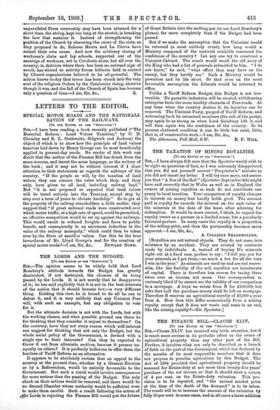TFITI LORDS AND THE BUDGET.
[To THE EDITOR OF THE "SPECTATOR."] SIR,—The opinion seems to be widely held that Lord Rosebery's attitude towards the Budget has greatly diminished, if not destroyed, the chances of its being passed by the Lords. It is not merely that he disapproves of it; he has said explicitly that it is not in the best interests of the nation that it should become law,—a very different thing. Holding this view, he is bound to do all he can to defeat it, and it is very unlikely that any Unionist Peer will, with such an example, feel any obligation to vote for it.
But the ultimate decision is not with the Lords, but with the working classes, and what possible ground can there be for thinking that they consider it unjust to themselves P On the contrary, have they not every reason which self-interest can suggest for thinking that not only the Budget, but the whole social policy of the Government, is devised with a single eye to their interests P Can they be expected to throw it out from altruistic motives, because it presses un- , equally on others P It is perfectly ludicrous to offer them the burdens of Tariff Reform as an alternative.
It appears to be absolutely certain that an appeal to the country at the present time, whether by a General Election or by a Referendum, would be entirely favourable to the Government. But such a result would involve consequences far more serious than the passing of the Budget. The only check on their actions would be removed, and there would be .no Second Chamber whose authority would be sufficient even to make them carefuL Such a result following the action of rthe Lords in rejecting the Finance Bill would put the future
of Great Britain into the melting-pot (to use Lord Rosebery's phrase) far more completely than if the Budget had been passed.
But if we make the assumption that the Unionists would be returned (a most unlikely event), how long would a Ministry composed of the material available command the confidence of the country P Let any one try to construct a Unionist Cabinet. The result would recall the old story of the King who had a list of generals submitted to him. " I do not know," he said, "what effect they may have on the enemy, but they terrify me." Such a Ministry would be powerless and its life short. So that even on the most favourable assumption the Liberals would be returned to office.
Unlike a Tariff Reform Budget, this Budget is not irre- versible. No parasitic industries will be created, withdrawing enterprise from the more healthy channels of Free-trade. At any time when the country desires it, its injustice can be removed. The Unionist Party, purged of Tariff Reform, and welcoming back its ostracised members (the salt of the party), may again be as strong as when Lord Salisbury left it, and will then again win the confidence of the country. In its present shattered condition it can do little but exist, little, that is, of constructive work.—I am, Sir, &c., The Atheneum, Pall Mall, S.W. E. P. HILL.










































 Previous page
Previous page